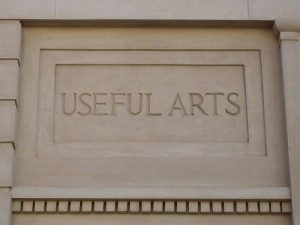Podcast: Play in new window | Download
Subscribe: Apple Podcasts |
 Adam, Brian, Carmen, and Jeff consider the boundaries of one’s own competence in this episode of The Engineering Commons.
Adam, Brian, Carmen, and Jeff consider the boundaries of one’s own competence in this episode of The Engineering Commons.
- Competencies seem to be driven by past failures, notes Brian.
- For learning about “magical potions” developed with “unicorn science” (chemical engineering), Brian recommends the NurdRage channel on YouTube.
- Brian takes a cruel pleasure in seeing Mehdi Sadaghdar regularly shock himself on the YouTube channel titled ElectroBOOM.
- The “circle of competence” is a notion introduced by Warren Buffett, to encourage investors to stick to businesses they understand exceedingly well.
- Brian attempts to recall a quote from Sun Tzu’s book, The Art of War: “If you know the enemy and know yourself, you need not fear the result of a hundred battles. If you know yourself but not the enemy, for every victory gained you will also suffer a defeat. If you know neither the enemy nor yourself, you will succumb in every battle.”
- Carmen proposes that the “circle” of competence might be better imagined as an “airy disk.”
- A Merlin Mann presentation from 2014 introduces the Dreyfus model of skill acquisition. (Accompanying notes are available online for those without time to watch the video.)
- Carmen and Brian just returned from a week-long short course at the Center for Power Electronic Systems (CPES) Laboratory, located on the campus of Virginia Tech.
- Jeff mentions a book by Walter G. Vincenti, What Engineers Know and How They Know It: Analytical Studies from Aeronautical History.
- A cat’s-whisker detector is one of the oldest semiconductor devices. It places a thin wire in contact with a semiconducting material, thereby creating an elementary diode.
- The American Association of Engineering Societies (AAES) has created an Engineering Competency Model.
- The gang discusses a web page located by Jeff, titled Ultimate Cognitive Bias Survival Guide.
Thanks to Ghost of Kuji for providing the photo titled “event horizon.” Opening music by John Trimble, and concluding theme by Paul Stevenson.
Podcast: Play in new window | Download
Subscribe: Apple Podcasts |
 This epiosde of The Engineering Commons finds Adam, Brian, and Jeff discussing what it means to be relevant, and how engineers can increase their relevance on the job.
This epiosde of The Engineering Commons finds Adam, Brian, and Jeff discussing what it means to be relevant, and how engineers can increase their relevance on the job.
- Brian is not entirely sure what a thought leader is, but he’s pretty certain he doesn’t want to be one.
- However, Brian invents the perfect term for someone who’s the opposite of a thought leader; they must be a thought-hole! (You heard it here first…)
- Jeff opines that one’s relevance is largely dependent on others; seeing yourself as relevant is not nearly as important as having others perceive you as relevant.
- Malcolm Gladwell has written a magazine article for The New Yorker about the difficulty of matching candidates with jobs, which he calls the “quarterback problem.”
- Brian notes that engineers often get hired based on the skill set needed to complete a behind-schedule project, rather than their abilities in getting a fresh project off to a good start.
- Lewin’s change management model (unfreeze, change, refreeze) is referenced by Jeff.
- We talked with Kathryn Jablokow about creative diversity in Episode 76; it’s possible to be creative through both adaption and innovation.
- Jeff makes the point that it’s possible to be relevant in many different ways, ranging from abstract observations to specific implementations.
- Daniel Pink authored the 2012 book “To Sell Is Human: The Surprising Truth About Moving Others.”
- Jeff inquires if Daniel Pink has a valid hypothesis; is it true that “we’re all in sales now?”
- We envision a class in self-promotion. Or as Brian terms it, learning the proper amount of humble-bragging. (Apparently, the proper amount is little, as humble-bragging isn’t the best form of self-promotion.)
- The ABC mantra of sales, according to author Pink, is no longer “always be closing,” but is now “attunement, buoyancy, and clarity.”
- Brian references Occam’s razor in describing the difficulty one encounters in pursuing clarity of meaning and intent.
- Robert Greene’s book “Mastery” has been on Brian’s reading list for a while.
- A 2013 article by Jason Nazar, in Forbes magazine, discusses “The 21 Principles of Persuasion.”
- Jeff makes the case that one can be relevant as a leader, follower, or rabble-rouser. His mental image? The “marching band” scene from the movie Animal House.
- A 2014 book, “The Second Machine Age: Work, Progress, and Prosperity in a Time of Brilliant Technologies,” is tangentially mentioned by Brian.
- Brian doesn’t think our future is as distopian as predicted by the YouTube video, “Humans Need Not Apply.”
- Jeff suggests building an emotional bond between humans and artificially created art is difficult (apparently forgetting about Japanese singing sensation Hatsune Miku).
- Adam puts out a request for a few engineering robots, if any of our listeners can access advanced AI technology.
Thanks to Richard Adams for the photo titled “Useful arts?” Podcast theme music by Paul Stevenson.
Practical insights for the engineering crowd
 Adam, Brian, Carmen, and Jeff consider the boundaries of one’s own competence in this episode of The Engineering Commons.
Adam, Brian, Carmen, and Jeff consider the boundaries of one’s own competence in this episode of The Engineering Commons.